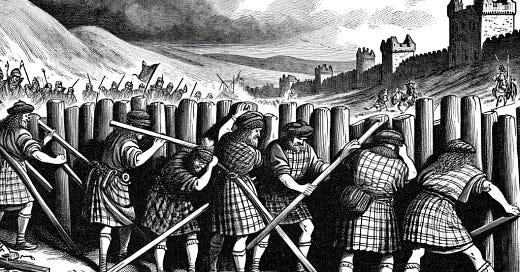Why were the Forsyth's considered "Restorer's of the Ruins."
The ancient adage, "Yesterday belongs to our ancestors; today belongs to us," encapsulates a profound truth: to appreciate the present and recognize our duties, we must understand the past. For the Forsyth family, this connection to the past is deeply woven into their legacy, encapsulated in their family motto, Instaurator Ruinae, or "Restorer of the Ruins." This motto not only signifies their historical resilience but also their ongoing commitment to honor and integrity across generations.
The Origins of the Motto
The Forsyth family motto, Instaurator Ruinae, was earned through valor and service. It highlights a legacy of restoration and fortitude, tracing back to their ancestral roles in Scotland and France. The motto was notably granted to the Forsyths of Scotland in recognition of their pivotal role in the Battle of Dykes. Robert Forsyth, a distinguished military leader, and his clan defended the walls of Dykes from an English raid, demonstrating exceptional bravery and strategic acumen.
The Battle of Dykes
The Battle of Dykes was a defining moment for the Forsyth family. When the English forces invaded Scotland with the intent to demolish the fortifications at Dykes, the Scottish king sought a leader who could halt the raid and buy time for his forces to assemble. Robert Forsyth, bearing the demi-griffin crest, volunteered for this perilous mission. Despite being outnumbered, he and his men stood their ground, turning the tide against the English invaders. This act of defiance and victory not only restored the physical ruins of the Dykes but also reinstated a sense of hope and resilience among the Scots.
In a vivid account of the battle, the English troops advanced with confidence, believing the Scottish defenses to be easily breached. However, they were met with fierce resistance. Robert Forsyth and his men utilized the rugged terrain to their advantage, setting traps and launching surprise attacks that bewildered and demoralized the English. Their tactics were not only a testament to their bravery but also to their ingenuity and intimate knowledge of the land. The successful defense of the Dykes became a symbol of Scottish tenacity and strategic brilliance, earning Robert Forsyth and his descendants a revered place in history.
Symbolism of the Motto
Instaurator Ruinae—"Restorer of the Ruins"—symbolizes more than just the physical act of rebuilding. It embodies the spirit of renewal and perseverance that has characterized the Forsyth family for centuries. The motto reflects their dedication to maintaining the integrity, patriotism, and high morality of their lineage, even in the face of adversity.
The act of restoring ruins goes beyond mere construction; it is about revitalizing the spirit and morale of a community. For the Forsyths, every stone they placed back in the walls of Dykes represented their commitment to their heritage and their future. This restorative spirit was passed down through generations, influencing their actions and decisions in both times of peace and conflict. It served as a reminder that even in the face of destruction, there is always the possibility of renewal and resurgence.
The Forsyth Coat of Arms and Heraldry
The Forsyth coat of arms further illustrates their storied past and noble ideals. The family crest, featuring a demi-griffin, signifies vigilance and strength. Historically, the griffin, a mythical creature with the body of a lion and the head of an eagle, represented both physical and intellectual prowess. The green griffin with red beak and claws on a polished steel shield symbolizes the family's enduring legacy of bravery and honor.
The heraldic symbols of the Forsyths are not merely decorative; they tell a story of a family that has weathered numerous storms and emerged stronger. The griffin, with its dual attributes of land and air, signifies the Forsyths' ability to adapt and thrive in various circumstances. The colors green and red in their crest are also significant—green representing hope and loyalty, and red symbolizing warrior spirit and strength. These elements combine to create a powerful emblem that encapsulates the family's virtues and history.
Legacy and Influence
The influence of the Forsyth family extends far beyond the battlefields of medieval Scotland. Their descendants, scattered across the globe in countries such as France, England, Ireland, America, and Australia, have carried the values encapsulated in Instaurator Ruinae into diverse fields and communities. Whether in times of war or peace, the Forsyths have consistently demonstrated a commitment to restoring what is broken, advocating for justice, and preserving their rich heritage.
In the New World, Forsyths were pioneers and community leaders. They brought with them the spirit of restoration, contributing to the development of new settlements and playing significant roles in local governance and social reform. In America, Forsyth descendants were among the early settlers who helped build thriving communities from the ground up. Their work in education, commerce, and civic duties reflected the same values of integrity and perseverance that their ancestors exhibited on the battlefields of Scotland.
Conclusion
The Forsyth family motto, Instaurator Ruinae, serves as a timeless reminder of the importance of resilience, integrity, and the continuous effort to restore and rebuild. By understanding and honoring their past, the Forsyths inspire current and future generations to live up to the noble ideals of their ancestors. As we navigate the challenges of today, let us draw inspiration from the Forsyth legacy and strive to be restorers of the ruins in our own lives and communities.
In a world that often seems divided and fractured, the Forsyths' commitment to restoration offers a powerful lesson. It teaches us that no matter how dire the circumstances, there is always the potential for renewal and growth. By embracing this ethos, we can contribute to a legacy of positive change, much like the Forsyths did throughout history. Whether through acts of kindness, community service, or personal resilience, we all have the capacity to be restorers of the ruins in our own unique ways.





